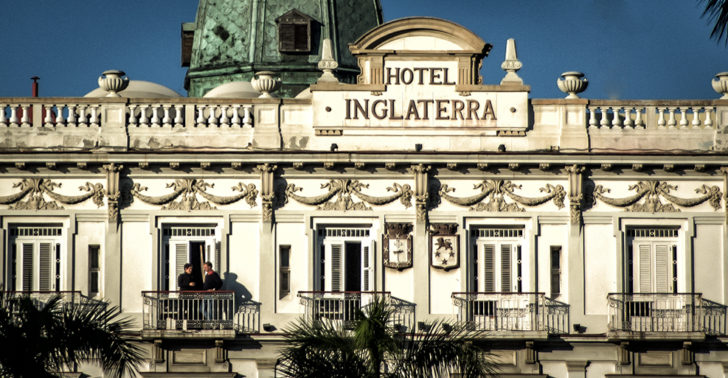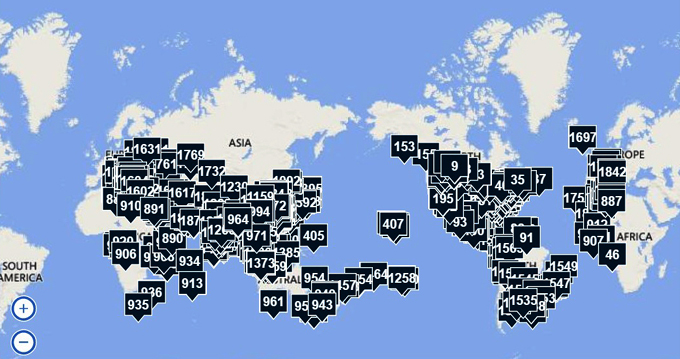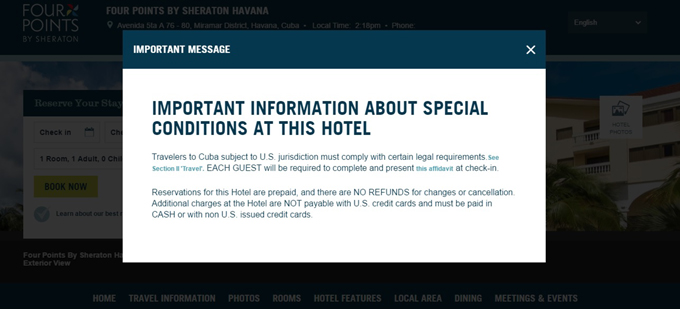
Starwood in Cuba: Behind the façade
HAVANA — Although discreet, businesses between Cuba and the United States flourish without waiting for the bilateral talks to end. From the very first signs of the thaw, the island has welcomed projects from “the North” heretofore unthinkable.
In the sector of tourism, for example, a ribbon-cutting ceremony this year symbolized the transfer of management of a hotel from Cuba to a U.S. firm, the first since 1959.
Under the Starwood umbrella, the former Quinta Avenida Hotel becomes the Four Points by Sheraton. Meanwhile, the emblematic Inglaterra Hotel, situated in the heart of Havana, prepares to join the Luxury Collection of the Starwood chain on Aug. 31.
Present in 100 countries, according to its website, Starwood received the green light from the U.S. Treasury Department to operate in Cuba and signed a contract with the local authorities.

Much is expected from that project, especially for the Cuban hotel industry, which has been pressed to improve its image and the quality of its services. On the other hand, there is much uncertainty regarding the instability that could affect business if the U.S. blockade [trade embargo] against the island persists.
Little more than a month after the establishment of the Four Points by Sheraton, its general director, Pablo Casal, was asked about the possible risks. He answered only, “Starwood obtained a license from the OFAC [the Treasury Department’s Office of Foreign Assets Control] and we’re operating the hotel under that legal framework.”
To professor and researcher José Luis Perelló, of the Tourism School at the University of Havana, neither hotel faces obstacles that might clash with the established policy. However, he says that “undoubtedly, the restrictions imposed by the blockade will limit the full and successful development of this negotiation.”
One factor to consider is that vacationing in Cuba remains out of bounds for Americans. In terms of tourism, the United States is the main source of traffic for the Caribbean.
According to Casal, “we should make clear that the U.S. market is still ruled by special regulations, so we are accepting only those travelers who qualify under the 12 categories allowed.”
In 2015, the arrival of Americans to Cuba increased by 76 percent, or 161,233 persons. That figure has risen to 96 percent in the current calendar, according to data from the Tourism Ministry, or MINTUR.
Conservative estimates indicate that once the 2000 travel ban has been lifted, at least one million Americans would pour into the island.
Another obstacle is that “additional charges at the Hotel are NOT payable with U.S. credit cards and must be paid in CASH or with non-U.S.-issued credit cards,” according to the Starwood website.

So far, only the MasterCards issued by Stonegate Bank and the Popular Bank of Puerto Rico may be used on the island, because of the limitations of the blockade.
“While the permission for Americans to come to Cuba as tourists would result in an increase in visits, we cannot predict if this will happen or when,” said Casal, of Uruguayan origin.
The United States invests in Cuba
The negotiations between Starwood and the Cuban hotel groups Gran Caribe and Gaviota represent, in Perello’s opinion, a demonstration of the possibilities of the tourism sector in Cuba in the opening to foreign investments and participation, especially with the United States. At the same time, “it helps to gradually normalize bilateral diplomatic, commercial and financial relations.”
In the opinion of Starwood’s chief of operations for Latin America, Jorge Giannattasio, the project is “a great achievement” and Cuba “won’t be the exception” of the “positive impact” the chain has had in the societies and markets where it operates.
According to the management contract, “Gaviota entrusted Starwood with the commercialization and day-to-day operation of the hotel,” explains director Casal. A similar purpose guides the agreement between Starwood and the state-run Gran Caribe, owner of the Inglaterra.
This type of deal is most often used in the tourism sector. “The main hotel chains led by the Americans use the mechanisms of non-share participation — such as contracts for operation, leasing and franchising — instead of ownership of the installations,” says professor Perelló, the university researcher.
That is the case of the various hotels all over the world that operate under the brand name of international chains, where only the management or commercialization is in the hands of the transnational company that owns the name. In fact, a national investor — even someone with little experience in the sector — can use his own land and built a hotel complex so that a foreign company may manage it under its brand name.
Recent MINTUR statistics reveal that so far 17 foreign hotel companies, sheltered under 76 contracts for management and commercialization, operate 86 hotels throughout Cuba.
Metamorphosis?
“Inglaterra, a Luxury Collection hotel, Havana. Inauguration on Nov. 1, 2016. No reservations taken yet.” That’s the notice found by anyone who wants to reserve a luxury room in Cuba.
Meanwhile, “reserve now” is the invitation by the Four Points by Sheraton in Havana, as of June 27, as it assumes, at least officially, the exigencies of the new brand.
Offering a select service is a distinguishing feature of Four Points hotels. But this one, in Havana, still lacks ingredients to do so.
“The changes involve the standards of Life & Safety and particularities of the brand, which cover all aspects of hotel management: service, amenities, beds, towels and more. We are in the process of implementing all this,” says director Casal.
The resources for this will come from the United States in the next several months, says Nancy Sarabia, the hotel’s Public Relations specialist. “For the coming year, there will be improvements, as we set a comfort level typical of the tastes and preferences of businessmen, our basic customers.”
While waiting for the improvements to be made in the 286 rooms, the employees learn the Starwood style. “From the first day, we have trained the personnel in our culture of service and we are very happy by the good reception they have given us. We have definitely found a good staff, very eager to work and learn,” Casal assures us.
And that’s something to be thankful for. “Check-in was remarkably smooth for a Cuban hotel. Front-desk clerks were solicitous and spoke fluent English,” wrote Michael Weissenstein, an Associated Press journalist, after his recent stay at the Four Points by Sheraton.
Nevertheless, he described the rest of his experience as “pretty unpleasant,” especially because of the absence of the promised amenities, those that are still to come, that must be imported.
After two years working at the Quinta Avenida, security chief Ramón Gómez acknowledges that, so far, the changes have not been significant. “In practice, we’re learning how to blend their work [the new management’s] with ours.”
But everyone at the Four Points hopes that the commercialization of the hotel will be fruitful, as Gómez does.
PR director Sarabia hopes that the transformations will result in a better future for the hotel, for the staff and the country in general. As to the wages, they’re staying the same. “I believe that the changes will be noticed later on. If the number of clients rises, I think the wages will improve.”
Casal is just as optimistic. “The prices vary according to the product and the market demand. So, considering the great demand that Havana is experiencing, we believe that we can predict an upward pressure in rates.”
For that to happen, however, the brand will have to stand behind the facade. Especially in the case of the Inglaterra and the Santa Isabel, once the letter of intention becomes a signed contract.
Photo at top: Carlos Ernesto Escalona Martí (Kako).


